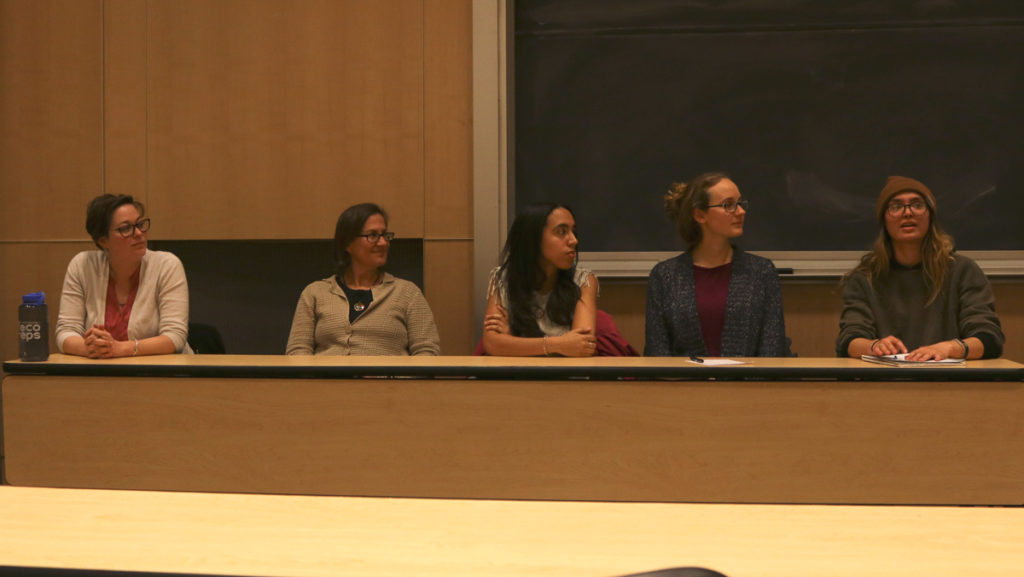The Ithaca College Environmentalists club held an open, student-led discussion to brainstorm possible solutions to sustainability issues at the college and in the college’s curriculum April 10.
Approximately 20 people attended the panel, which consisted of professors, staff and students in Textor 103. The panel of five included Rebecca Evans, campus sustainability coordinator in the Office of Energy Management and Sustainability; Susan Swensen Witherup, professor in the Department of Biology; junior Laura Waxman, an intern in the Office of Energy Management and Sustainability; senior Mara Erb, former Student Government Council sustainability coordinator; and junior Marisa Lansing, an Eco-Rep.
The conversation started with a Q&A conversation among juniors Ryan Price, president of ICE, and Sophie Johnson, vice president of ICE, and the panel to address how the college can get students more involved in sustainability on campus.
Price said the event was in response to a luncheon hosted by the Office of Energy Management and Sustainability that happened in the beginning of the semester. Sustainability administrators from the Office of Energy Management and Sustainability and individual students interested in sustainability attended the luncheon. Price said the meeting was not well–attended by students who were invited, which raised the question of whether students were adequately involved in campus sustainability.
The panel discussion focused on identifying problems with student involvement in sustainability and talking about possible solutions. The panel also discussed integrating sustainability into more courses and everyday life for students and professors, as well as combining efforts with other groups on campus, like social justice and advocacy groups.
While talking about getting more students to think about being more sustainable, panelists talked about “base knowledge,” or the average amount of knowledge students come to college with about sustainability. They talked about possible ideas on how to expand this base knowledge and better educate students who may not have an expansive background in sustainability. Evans brought up the possibility of adding a sustainability presentation during freshman orientation.
Another topic attendees discussed was expanding the Integrative Core Curriculum and theme courses to include teaching about sustainability. Although there is currently an ICC theme, Quest for a Sustainable Future, that focuses on sustainability, it limits students in other themes from learning about sustainability. A solution could also include adding more possible courses that combine topics, such as an environmental justice course.
Price said he is confident that this open conversation will eventually lead to changes and more conversations about sustainability on campus.
“I think it went mostly well overall,” Price said. “There was a good blending of voices and opinions. I think we have a good idea moving forward of how we can integrate sustainability more into academics here.”
Freshman Brianna LaSita said she enjoyed the setup of the event and felt that the conversation style allowed the conversation to be more inclusive.
“You can get different sides of the perspective,” LaSita said. “I think there were strides made in making sustainability more accessible on our campus and in the curriculum.”
Junior Michael Moritz said he found that the strength in the panel was that the panelists were all women with diverse perspectives. He said he liked that it included different positions, like students, staff and professors, and different groups such as the Eco-Reps, Environment Betterment Committee and the Office of Energy Management and Sustainability.
“Overall, I think the panel went really well,” Moritz said. “I think the biggest motivational piece that I’m walking away with is the fact that I can go into my professors’ offices and be like, ‘We need to incorporate more classes and themes within our curriculum.’”
Price said he is hopeful that going forward, the ideas mentioned in the panel will be implemented, or at least explored to a greater extent.
“I think eventually it’s going to happen and regardless, talking about it is going to do something because it’s going to get people thinking,” Price said. “And so hopefully more and more conversations will happen, and the conversation will just flow throughout campus.”








